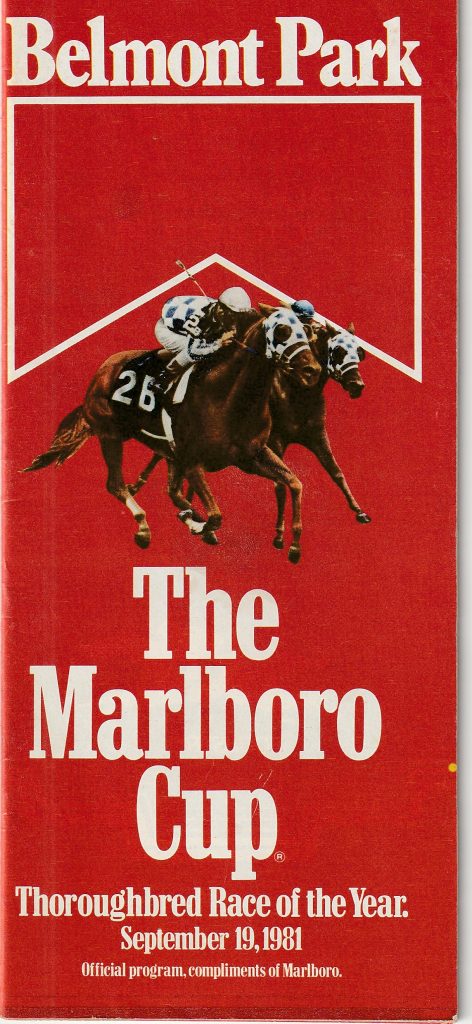
It was the race that was created for a superstar, featured the first ever matchup between Triple Crown winners, and was synonymous with September – a time when most three year olds face their older foes for the first time. Yet a mere fourteen years after its creation, this Grade One race was run for the last time. This is the story of the rise and fall of the Marlboro Cup.
It was 1973 and all of America had fallen in love with Secretariat, the first horse to sweep the Triple Crown in a quarter of a century. Fans packed grandstands just to watch his workouts. He was a TV ratings bonanza – earning higher Nielson ratings than most sitcoms. Hoping to cash in on Secretariat’s popularity, John T. Landry, the Vice President of Marketing for Philip Morris, dreamed up the perfect promotion – a match race between the wonderhorse and his stablemate, the hard-knocking 1972 Kentucky Derby and Belmont winner Riva Ridge. Their owner, Penny Chenery, not only was “in”, she vowed to donate all the purse money to charity. The race would be called the Marlboro Cup and Philip Morris would supply $200,000 towards the purse money, with the NYRA kicking in another $50,000. The Marlboro Cup was to be part of a 4-race broadcast series starring Secretariat which would also include the Whitney, the Woodward, and the Jockey Club Gold Cup. It was a win-win proposition for everyone. Until Secretariat was upset by Onion in the Whitney and Riva Ridge was defeated by a 56-1 shot in a turf race.
The Philip Morris powers-that-be were unhappy to be sponsoring a contest between two losers so the format was changed from a match race to an invitational. Instead of just his stablemate, Secretariat would now face five other horses – Onion, his conqueror in the Whitney, turf champion Cougar II, Travers winner Annihilate ‘Em, 1971 Canadian Horse of the Year Kennedy Road, and 1972 American Champion Three Year Old Key to the Mint. After his loss in the Whitney, Secretariat had spiked a fever and suffered from a viral infection, forcing him to skip the Travers. Still, the question remained – had the Triple Crown grind taken its toll on the champion? Secretariat answered with a resounding “no”, not only demolishing the field of older horses in the Marlboro Cup but doing it in the world record time of 1:45 2/5 for the 1 1/8 miles. That photo of Secretariat cruising past a game Riva Ridge became a marketing staple for Marlboro cigarettes for many years to come.
After Secretariat’s retirement, racing fans embraced a new hero – the mighty Forego. But despite his best efforts, the gritty gelding just couldn’t seem to get the job done in the Marlboro Cup, losing to Big Spruce in 1974 and Wajima in 1975. As the field turned for home in the 1976 Marlboro Cup, Forego appeared hopelessly beaten – wide, far back and running over a sloppy track that he disliked. It turned out to be his greatest performance. Toting 137 pounds, the champion dug deep and came roaring up in the final furlongs to nip Honest Pleasure by a nose at the wire.
Designated as a Grade One race in 1975, the Marlboro Cup saw plenty of drama over the years such as the shocking longshot win of Proud Birdie in 1977, but nothing would ever top the 1978 rendition which featured the first ever contest between two Triple Crown winners – Seattle Slew and Affirmed. On September 18, 1978 Belmont Park fans were treated to history in the making as Seattle Slew sprang to the lead and never looked back while Affirmed bravely tried but failed to catch him.
There was also plenty of drama in the 1979 running as well, none of which involved the actual race itself. When Affirmed was assigned 133 pounds for the race, trainer Laz Barrera cried foul and withdrew him, unwilling to concede nine pounds to the 1979 Kentucky Derby and Preakness winner Spectacular Bid. Although Bid won easily, his outspoken trainer Bud Delp had accused Barrera of being a coward in the press. That criticism came back to haunt Delp the following year when he scratched Bid from the 1980 Marlboro Cup after the horse was assigned 136 pounds for the race, thirteen more than the eventual winner, Winter’s Tale.
In 1984 Slew O’ Gold earned a million dollar bonus when he became the first and only horse ever to sweep the Fall Championship Series, which was comprised of the Marlboro Cup, the Woodward Stakes and the Jockey Club Gold Cup. It was also the same year that the first Breeders’ Cup World Championships were run. Although Slew O’ Gold lost the Breeders’ Cup Classic, his victories in the Fall Championship races were enough to earn him Horse of the Year. He would be the last Marlboro Cup winner to attain that honor.
In the years following the inaugural Breeders’ Cup Classic, the Marlboro Cup began to lose its luster. Despite purse increases and its rich history, interest in the race had declined so much that only five horses contested the 1987 running which was won by Java Gold and broadcast only on cable television. The Marlboro Cup was no longer profitable as a marketing tool for Philip Morris and without a sponsor, the race was discontinued. As the Thoroughbred foal crops continue to decline and with racehorses making fewer career starts, it is unlikely that this grand race will ever make a comeback but the memories will forever live on.
Dawn Lefevre photo


